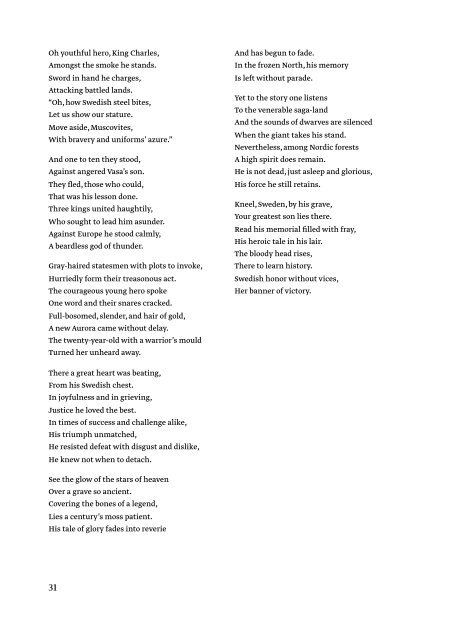Polyglossia 2017
You also want an ePaper? Increase the reach of your titles
YUMPU automatically turns print PDFs into web optimized ePapers that Google loves.
Oh youthful hero, King Charles,<br />
Amongst the smoke he stands.<br />
Sword in hand he charges,<br />
Attacking battled lands.<br />
“Oh, how Swedish steel bites,<br />
Let us show our stature.<br />
Move aside, Muscovites,<br />
With bravery and uniforms’ azure.”<br />
And one to ten they stood,<br />
Against angered Vasa’s son.<br />
They fled, those who could,<br />
That was his lesson done.<br />
Three kings united haughtily,<br />
Who sought to lead him asunder.<br />
Against Europe he stood calmly,<br />
A beardless god of thunder.<br />
Gray-haired statesmen with plots to invoke,<br />
Hurriedly form their treasonous act.<br />
The courageous young hero spoke<br />
One word and their snares cracked.<br />
Full-bosomed, slender, and hair of gold,<br />
A new Aurora came without delay.<br />
The twenty-year-old with a warrior’s mould<br />
Turned her unheard away.<br />
There a great heart was beating,<br />
From his Swedish chest.<br />
In joyfulness and in grieving,<br />
Justice he loved the best.<br />
In times of success and challenge alike,<br />
His triumph unmatched,<br />
He resisted defeat with disgust and dislike,<br />
He knew not when to detach.<br />
See the glow of the stars of heaven<br />
Over a grave so ancient.<br />
Covering the bones of a legend,<br />
Lies a century’s moss patient.<br />
His tale of glory fades into reverie<br />
And has begun to fade.<br />
In the frozen North, his memory<br />
Is left without parade.<br />
Yet to the story one listens<br />
To the venerable saga-land<br />
And the sounds of dwarves are silenced<br />
When the giant takes his stand.<br />
Nevertheless, among Nordic forests<br />
A high spirit does remain.<br />
He is not dead, just asleep and glorious,<br />
His force he still retains.<br />
Kneel, Sweden, by his grave,<br />
Your greatest son lies there.<br />
Read his memorial filled with fray,<br />
His heroic tale in his lair.<br />
The bloody head rises,<br />
There to learn history.<br />
Swedish honor without vices,<br />
Her banner of victory.<br />
Extract from<br />
I, too, am Catalan<br />
Najat el Hachmi<br />
In 2004 Najat El Hachmi, who would go on to win the<br />
Premi Ramon Llull with the novel L’Últim Patriarca,<br />
published a memoir entitled Jo també sóc catalana, as<br />
yet untranslated to English. Jo també offers an insight<br />
into the mapping of dynamics of gender, race<br />
and religion onto a unique, bilingual cultural landscape.<br />
The Catalan language is a supreme symbol of<br />
belonging, and proficiency is expected of immigrants,<br />
but signs that an immigrant has taken possession of<br />
the language as their own also arouse jealousy. Here<br />
El Hachmi experiences this hypocrisy whilst shopping<br />
with her young song.<br />
Translated from Catalan by Jessica Bullock<br />
The linguistic milieu depicted in Jo també challenges<br />
convention, which dictates that any speech in a ‘foreign’<br />
language remain untranslated, especially in a<br />
passage which plays upon the particular relationship<br />
of two tongues. Leaving the Castilian untranslated<br />
creates a greater divide between Najat and the shopkeeper<br />
than in the source text, but translating the<br />
whole dialogue into English would obliterate the tension<br />
between the familiar and the alien that is crucial<br />
to El Hachmi’s presentation of the experience of immigration.<br />
✴<br />
Rida gets off the bus with his usual smile,<br />
hugging me just as tight day after day, rucksack<br />
on his back. He smells like school.<br />
We need to go shopping, son. As usual, he<br />
doesn’t stop demanding, I want this, Mummy,<br />
I want that. At the till he helps me to pack<br />
everything up. The girl behind it, a little tired,<br />
says to him:<br />
“Hola guapo. Que vas a la escuela?” * The<br />
Plana accent is a stamp that a whole lifetime<br />
cannot erase.<br />
answer.<br />
Rida, shocked, stays mum and does not<br />
“Que no habla este niño?”<br />
“He does talk, in fact he’s very talkative,<br />
31<br />
32


